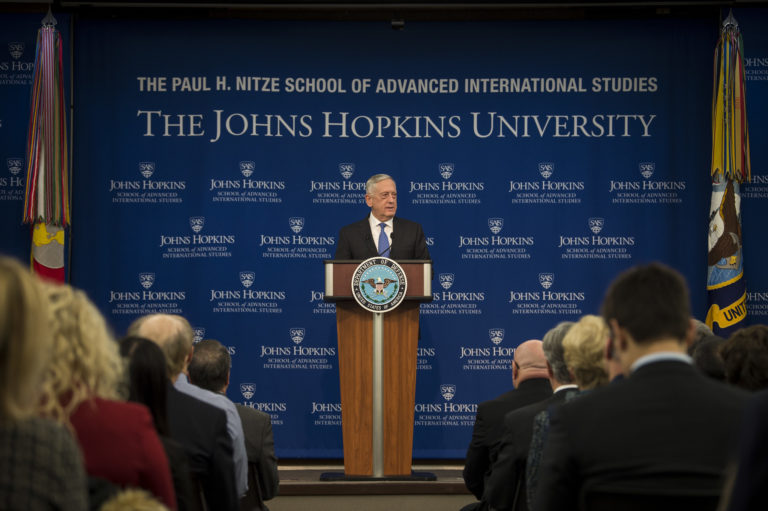Bad Idea: “Great Power Competition” Terminology

The Trump administration’s 2017 National Security Strategy (NSS) asserted that “great power competition” had returned “after being dismissed as a phenomenon of an earlier century.” Notably, the subsequent 2018 National Defense Strategy (NDS) did not use this wording, instead calling out “the reemergence of long-term, strategic competition by… revisionist powers.” But when Secretary of Defense Jim Mattis introduced the strategy in January 2018, he stated, “great power competition—not terrorism—is now the primary focus of U.S. national security.” This was the right strategic decision and a smart shift in focus for the Department of Defense (DoD). But “great power competition” is the wrong term to describe this new strategic priority.
The phrase “great power competition” conflates the threats posed by China and Russia, making it harder to prioritize between the two. Preparing the U.S. military to deter and defend against China requires a different set of capabilities from those that are needed to handle contingencies with Russia. East Asia is largely a maritime environment primarily requiring naval and air forces, whereas Eastern Europe necessitates a greater focus on ground forces. Using great power competition terminology obscures this reality, making it more difficult to decide which challenge poses the greater threat and should subsequently receive more attention and resources. As a result, Trump administration leaders often had to clarify that their priorities were “China, China, China.” A Biden advisor has similarly stated that their priorities will be “China, China, China, Russia.” Since many defense leaders have already moved past the vague great power competition wording, it is time the rest of us do as well.
Using great power competition in reference to Russia is also misleading because Moscow no longer qualifies as a “great power.” Russia is the world’s 9th most populous country — with fewer people than Bangladesh — and a declining population. Russia also has the world’s 12th largest economy and a GDP per capita that ranks 74th globally. Sure, Russia has nuclear weapons, but so do Pakistan, North Korea, and Israel. None of these are typically called great powers. The fact that Vladimir Putin acts like Russia is still a great power does not change these realities. In fact, by lumping Russia in with China under the umbrella of great power competition, the Pentagon has given Putin credit for his destabilizing actions and equated fundamentally distinct challenges. Facing tightening resource constraints, the United States can no longer afford this muddled thinking.
Furthermore, great power terminology obscures the reality that the competitions with China and Russia are only partially about power. Leaders in Beijing and Moscow frequently suggest that the root cause of the current tensions is Washington’s concern about its relative decline. But U.S. worries about China and Russia are founded as much in clashing values and visions as in clashing power. The Chinese Communist Party’s repression at home and coercion abroad have driven America’s reassessment of its threat to U.S. interests, as have Putin’s assassination campaign and interference in democratic elections. With this in mind, thirty bipartisan experts recently suggested it was time to link U.S. values and strategy in order to leverage shared democratic values. After all, the competitions in the strategic, economic, technological, and governance domains have as much to do with values and rules as power. A change in language would help to make clear that America’s top priority is upholding these key shared rules and norms. After all, power should be a means to an end, not an end in itself.
Finally, great power language minimizes the critical role of other countries in these competitions, wrongly suggesting that the “real” contest is between the United States and China (or Russia) and that regional states are somehow secondary. Yet, the center of gravity in these competitions is the alignment decisions of regional states. America’s quintessential advantage is its global network of alliances and partnerships; focusing on “great powers” minimizes the role of these countries. The terminology also reminds “third-party” countries that great power “elephants” sometimes strike deals without them. As Singaporean leader Lee Kuan Yew warned of Sino-American rapprochement in 1973, “When elephants fight, the grass suffers… when elephants flirt, the grass also suffers… when they make love, it is disastrous.” America’s alliances and partnerships are Washington’s greatest strength, so why would we adopt language that undermines our biggest asymmetric advantage over China and Russia?
For all these reasons, the Biden administration would be wise to jettison great power competition terminology when it comes into office. The great power terminology used in the NSS is misleading and counterproductive. It lumps China and Russia together, wrongly implies that Russia is a great power, incorrectly suggests these competitions are mostly about power, and sidelines key allies and partners. Therefore, the Biden administration would be wise to retain this Trump-era strategic shift while doing away with its terminology. The “great power competition” concept may have been useful a few years ago for reorienting America’s strategic focus, but every idea has its time and place – and great power competition has outlived its usefulness.
CSIS does not take specific policy positions; accordingly, all views expressed above should be understood to be solely those of the author.
(Photo Credit: DoD photo by Navy Mass Communication Specialist 1st Class Kathryn E. Holm)

